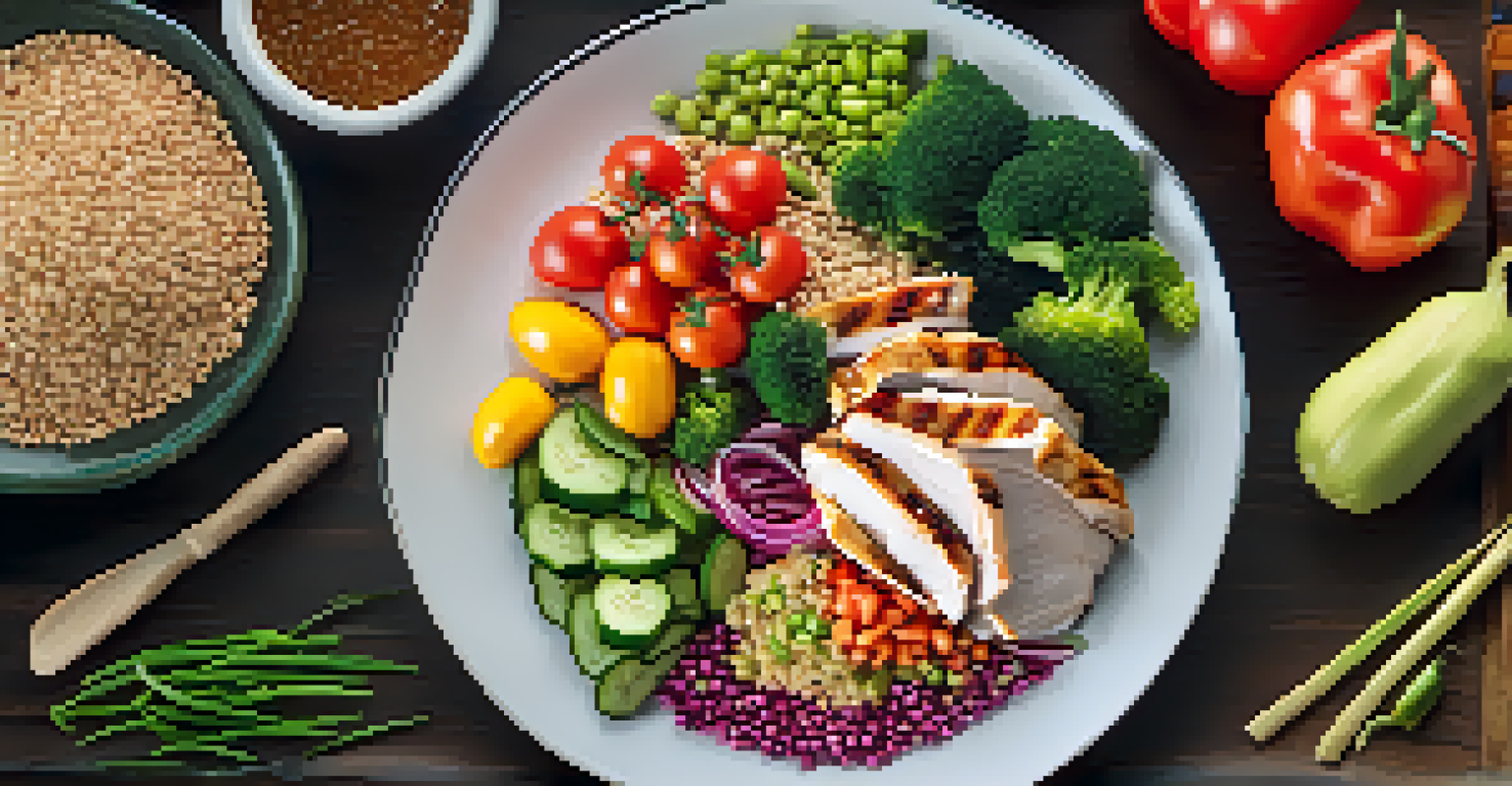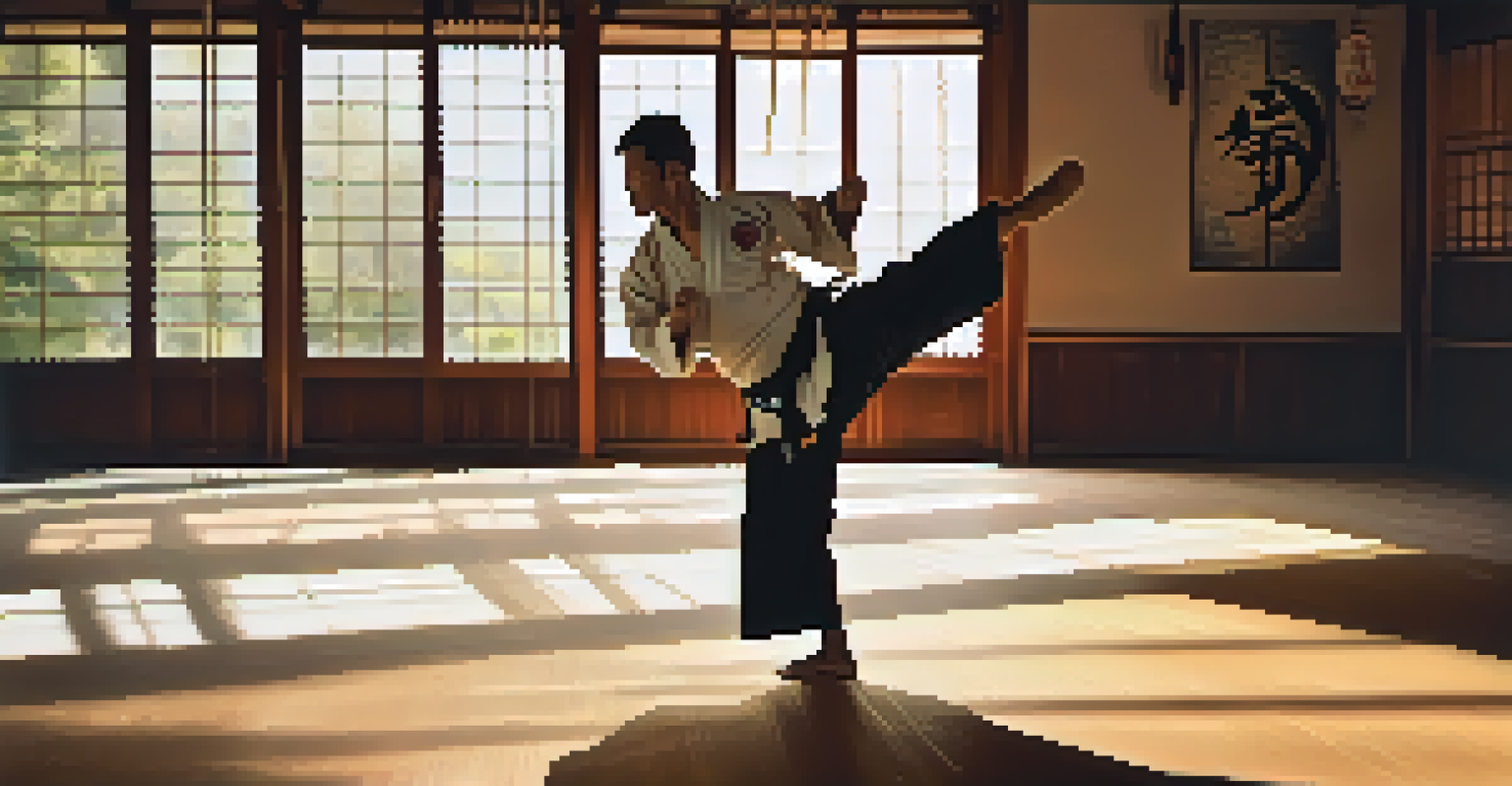Understanding Macronutrients for Martial Artists' Performance

What Are Macronutrients and Why Are They Important?
Macronutrients are the nutrients our bodies need in large amounts to function properly. They include carbohydrates, proteins, and fats, each playing a unique role in our overall health and athletic performance. For martial artists, understanding how these nutrients work together can make a significant difference in training outcomes and recovery.
You are what you eat, so don't be fast, cheap, easy, or fake.
Carbohydrates serve as the primary energy source, fueling intense training sessions and competitions. Proteins are essential for muscle repair and growth, while fats provide a more sustained energy source, especially for longer training sessions. By balancing these macronutrients, martial artists can optimize their performance and endurance.
Incorporating the right mix of macronutrients into your diet can lead to improved strength, agility, and recovery. Whether you're training in karate, judo, or mixed martial arts, understanding macronutrients is crucial for reaching your peak performance.
Carbohydrates: The Fuel for Your Training
Carbohydrates are often considered the main fuel source for high-intensity exercise, which is why they are vital for martial artists. Think of carbohydrates as the gas in your car; without enough fuel, your performance will sputter. They help maintain energy levels during intense training sessions and competitions.

There are two types of carbohydrates: simple and complex. Simple carbs, like fruits and sugars, provide quick energy, while complex carbs, found in whole grains and legumes, offer sustained energy release. For martial artists, it's essential to choose a mix of both to ensure quick bursts of power and endurance.
Macronutrients Fuel Training Success
Understanding and balancing carbohydrates, proteins, and fats is vital for martial artists to optimize performance and recovery.
To optimize your training, aim to consume carbohydrates before, during, and after workouts. This strategy can help replenish glycogen stores, improve recovery, and keep you performing at your best, whether you're training for a belt test or preparing for a championship.
Proteins: Building Blocks for Strength and Recovery
Proteins are often called the building blocks of life because they play a crucial role in muscle repair and growth. For martial artists, having enough protein is essential for recovering from intense training sessions and preventing injuries. Imagine your muscles as a house; without a solid structure, it can't stand strong.
Fitness is not about being better than someone else. It's about being better than you used to be.
After a rigorous workout, your muscles experience tiny tears that need repairing. Consuming protein helps to rebuild these muscles stronger and more resilient. Foods rich in protein, like chicken, fish, eggs, and legumes, should be staples in a martial artist's diet.
The timing of protein intake is also important. Aim to consume protein-rich meals or snacks within 30 minutes after training to maximize recovery. By prioritizing protein, martial artists can enhance their strength, speed, and overall performance.
Fats: Essential for Energy and Hormonal Balance
Fats often get a bad rap, but they are crucial for overall health and performance, especially for martial artists. They provide a dense source of energy and support the absorption of fat-soluble vitamins, which are vital for health. Think of fats as the slow-burning logs in a fire, providing energy over a longer period.
There are different types of fats, including saturated, unsaturated, and trans fats. Unsaturated fats, found in nuts, seeds, and avocados, are the healthiest options and should make up the bulk of your fat intake. These fats also help regulate hormones that can affect mood and performance.
Hydration Enhances Performance
Staying adequately hydrated is essential for martial artists as it supports energy levels, focus, and overall health.
Incorporating healthy fats into your diet can enhance endurance and prevent fatigue during longer training sessions. A balanced diet that includes fats will help martial artists maintain energy levels and improve overall performance.
Hydration: The Overlooked Macronutrient
While not a macronutrient in the traditional sense, hydration is essential for optimal performance and recovery. Our bodies are made up of approximately 60% water, and staying hydrated helps regulate temperature, transport nutrients, and remove waste. For martial artists, dehydration can lead to decreased performance and increased risk of injury.
During training, it's crucial to drink water before, during, and after exercise to stay hydrated. If you're training for extended periods or in hot conditions, consider electrolyte-rich drinks to replenish lost minerals. Think of hydration as the oil in a machine; without it, everything grinds to a halt.
By prioritizing hydration, martial artists can improve their focus, endurance, and recovery times. Making water intake a habit will not only enhance performance but also promote overall health.
Meal Timing: When to Fuel for Peak Performance
Meal timing is just as important as what you eat. For martial artists, understanding when to fuel your body can enhance performance and recovery. Eating the right foods at the right times can make a significant difference, much like tuning an instrument for a perfect melody.
It's generally recommended to eat a balanced meal containing carbohydrates and protein about 2-3 hours before training. This ensures that your body has enough energy to perform at its best. After training, consuming a meal or snack with protein and carbs within 30 minutes is crucial for muscle recovery.
Meal Timing Boosts Recovery
Strategically timing meals with the right nutrients helps martial artists enhance their training sessions and muscle recovery.
By paying attention to meal timing, martial artists can optimize their training sessions and recovery periods. This strategic approach helps maintain energy levels and supports muscle repair, leading to better performance in the long run.
Supplements: Do Martial Artists Need Extra Nutrients?
Supplements can sometimes fill nutritional gaps, but they should complement a balanced diet, not replace it. Many martial artists wonder if they need extra nutrients to enhance their performance. While some supplements, like protein powders and creatine, can be beneficial, it’s essential to consult a healthcare professional before starting any new regimen.
Whole foods should always be the priority because they provide a range of nutrients that supplements can't replicate. For example, fruits and vegetables offer vitamins, minerals, and antioxidants that support overall health and recovery. Think of supplements as the icing on the cake; they add a little extra but aren’t the main ingredient.

If you decide to take supplements, ensure they are high-quality and specifically tailored to your needs. This way, martial artists can enhance their training and recovery while still focusing on a healthy, balanced diet.
Creating a Balanced Diet for Martial Artists
To maximize performance, martial artists should aim for a balanced diet that incorporates all three macronutrients. This means having a variety of foods that provide carbohydrates, proteins, and healthy fats. Think of it as building a well-rounded team; each member plays a crucial role in achieving success.
A great starting point is to fill half your plate with vegetables and fruits, a quarter with lean protein, and a quarter with whole grains. This balance helps ensure you're getting the nutrients you need for energy, recovery, and overall health. Customizing your meals based on your training regimen can further enhance performance.
Macronutrients Boost Performance
Understanding and balancing carbohydrates, proteins, and fats can significantly enhance martial artists' training outcomes and recovery.
Additionally, keeping a food diary can help track what you eat and identify areas for improvement. By focusing on a balanced diet, martial artists can boost their performance, enhance recovery, and maintain their overall well-being.